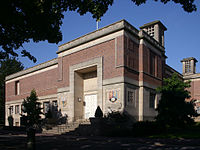Barber Institute of Fine Arts
 |
|
| Established | 1932 |
|---|---|
| Location | Edgbaston, Birmingham |
| Director | Nicola Kalinsky |
| Curator | Eurydice Georganteli (curator of coins) |
| Website | www |
The Barber Institute of Fine Arts is an art gallery and concert hall in Birmingham, England. It is situated in purpose-built premises on the campus of the University of Birmingham.
The Grade II listed Art Deco building was designed by Robert Atkinson in the 1930s and opened in 1939 by Queen Mary. The first building to be purpose-built for the study of art history in the United Kingdom, it was described by architectural historian Sir John Summerson as representing "better than almost any other building (except, perhaps the RIBA in Portland Place) the spirit of English architecture in the 1930s." The layout of the museum is centred on a central concert hall which is surrounded by lecture halls, offices and libraries on the ground floor and art galleries on the first floor.
In the 2005 Penguin Books publication Britain's Best Museums and Galleries, the Barber Institute was one of only five galleries outside London to receive five stars for having "Outstanding collections of international significance" (the others were the National Gallery of Scotland, Oxford University's Ashmolean Museum, Cambridge University's Fitzwilliam Museum and the Walker Art Gallery, Liverpool).
The Institute is located 5 km southwest of the city centre at the East Gate of the university campus and has one of the most outstanding collections of art assembled in Britain in the 20th century, including works by Gwen John, André Derain, Fernand Léger, René Magritte and Egon Schiele. It was set up by Martha Constance Hattie Barber in memory of her husband Henry Barber, a wealthy property developer who made his fortune expanding Birmingham's sprawling suburbs. Lady Barber was a descendant of the old Birmingham family of Bellowsmakers known as Onions and was an heiress in her own right. By his mid-thirties, the couple had retired but their connections with the city remained strong. In 1924, Henry Barber received a baronetcy for 'Political Services to Birmingham'.
...
Wikipedia
